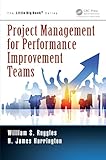Project management for performance improvement teams / authored by William S. Ruggles and H. James Harrington
By: Harrington, H. J. (H. James) [author.]
Contributor(s): Ruggles, William S [author.]
Language: English Series: Little big book seriesPublisher: Boca Raton, FL : CRC Press, Taylor & Francis Group, CRC Press is an imprint of the Taylor & Francis Group, an informa business [2018]Copyright date: c2018Description: xxxix, 185 pages ; 24 cmContent type: text Media type: unmediated Carrier type: volumeISBN: 9781466572553 (pbk. : alk. paper); 9781138497153 (hardback : alk. paper)Subject(s): Portfolio management | Teams in the workplace | Organizational effectivenessDDC classification: 658.4/022 LOC classification: HG4529.5 | H367 2018| Item type | Current location | Home library | Call number | Status | Date due | Barcode | Item holds |
|---|---|---|---|---|---|---|---|
 BOOK
BOOK
|
COLLEGE LIBRARY | COLLEGE LIBRARY SUBJECT REFERENCE | 658.4/022 (Browse shelf) | Available | CITU-CL-48745 |
Browsing COLLEGE LIBRARY Shelves , Shelving location: SUBJECT REFERENCE Close shelf browser

|

|

|

|

|

|

|
||
| 658.4/013 K284 2005 Six Sigma demystified / | 658.4/013 Q25 2005 Quality management / | 658.4/013 Sl25 2006 Design for Six Sigma statistics : 59 tools for diagnosing and solving problems in DFSS initiatives / | 658.4/022 Project management for performance improvement teams / | 658.4/03 L559 2009 The art and science of 360-degree feedback / | 658.4/03 M521 2006 Profit mapping : a tool for aligning operations with future profit and performance / | 658.4/03 R292 2007 Quantitative analysis for management / |
Includes index.
Includes bibliographical references and index.
About the author -- Introduction -- The traditional frameworks for project management for continual improvement -- A contemporary framework for applying project management to continual improvement for performance improvement teams -- Project change management -- Project technology management -- Chatper 5. stage #1: Align the project -- Stage #2: Plan the project -- Stage #3: Execute the project work -- Stage #4: Check/act-on the latest performance data -- Stage #5: Confirm the results (iterate?) -- Sustaining the gains and realizing the benefits -- Connecting with the organization's pmo -- Epilogue -- Glossary of terms -- Index.
Features
Highlights the shortcomings of the traditional frameworks for Project Management and Continuous Improvement when applied to 21st-century performance excellence initiatives.
Presents a contemporary framework for managing 21st-century projects with 2 case studies: one for a non-profit healthcare program and the other for a for-profit pharmaceutical company.
Emphasizes continuous improvement applied to performance improvement projects.
Adds two new "performance domains" for managing 21st-century projects: "Project Change Management" and "Project Technology Management".
Shows how to ensure a project is aligned with its Business Case throughout the life cycle to ensure the promised benefits are delivered in a cost-effective, timely fashion.
Summary
Project Management for Performance Improvement Teams (or, PM4PITs, for short) provides practical guidance based on innovative concepts for project teams -- especially Performance Improvement Teams (PITs)?and their Project Managers on how to successfully complete individual projects and programs using an ingenious and scalable framework based on an innovative foundation fusing together elements of Project Management, Innovation Management, and Continual Improvement. This book lays out how Project and Program Managers and their teams can "do those right projects the right way," one project at a time.
It details what continual improvement, change, and innovation are, why they are so important, and how they apply to performance improvement?both incremental and transformative. The authors examine the four types of work and workforce management in organizations, Strategic, Operations, Projects, and Crises, using four common comparative variables: Proactive/Preventive versus Reactive/Corrective, Temporary/Unique versus Ongoing/Repetitive, Innovative versus Maintaining the Status Quo, and Schedule Focus: Fiscal Year versus Short Term versus Long Term. These comparisons set the stage for the uniqueness of the third type: Projects (and Programs) that are fundamentally change-driven.

There are no comments for this item.